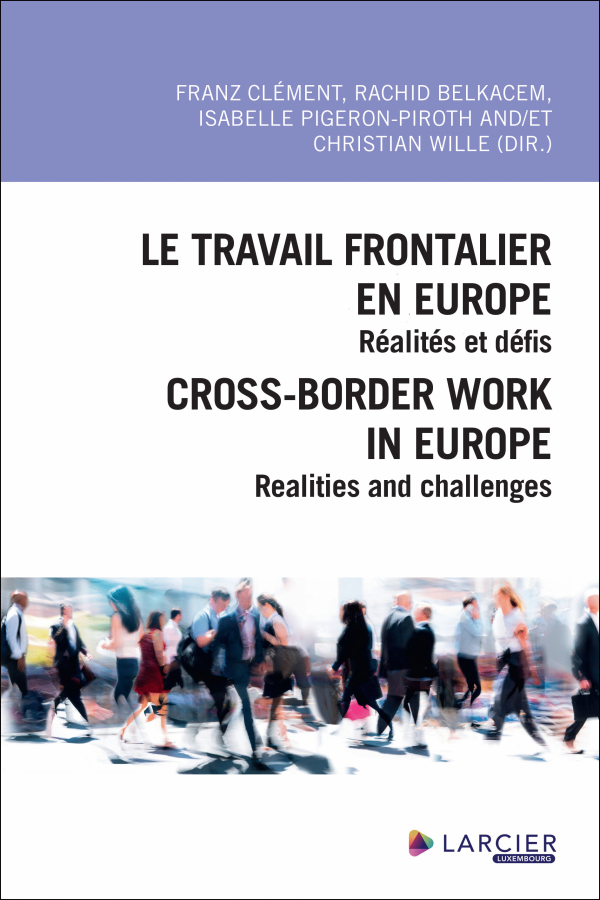Book project – Cross-border Work in Europe
More and more people in Europe commute daily to their workplace in a neighboring country, especially Switzerland and Luxembourg. Cross-border mobility results from socioeconomic imbalances in border regions, provides growth and purchasing power, and requires close coordination of European social systems. At the same time, it sets regional policy cooperation processes in motion, generates a cross-border regional belonging and calls civil society actors on both sides of borders into action. Thus, cross-border work cannot be explained in economic terms alone, but requires considerations from different perspectives.
The editors of the book "Cross-border Work in Europe" have made it their task to take such a multi-perspective view. They distinguish between socio-economic, socio-cultural, territorial and legal dimensions of cross-border work and discuss them on the basis of case studies in European border regions. The topics range from income differences, labor market access, employee representation, language, identity, and everyday life to regional development, transport, and legal issues.

The book contributions show that cross-border flows regulate the supply and demand of labor in border regions, but are also effective in other societal fields from the local to the European scale. Cross-border work therefore stands for a research object that brings together different dimensions and topics and offers a great potential for cross-border learning and development processes. For this reason, the book’s editors propose the establishment of a European research program on cross-border work: The transversal "European Cross-border Work Studies" should present practice-oriented approaches for integrated development in border regions and build an interdisciplinary as well as intersectoral bridge between border scholars and regional decision-makers.
Bibliographic information
Clément, Franz / Belkacem, Rachid / Pigeron-Piroth, Isabelle / Wille, Christian (ed.) (2023): Cross-border Work in Europe. Regional Practices and Realities | Le travail frontalier en Europe. Pratiques et réalités régionales. Bruxelles, Larcier. More information
Authors
Dorte Jagetic Andersen, Moreno Baruffini, Rachid Belkacem, Claudio Bolzman, Martine Camiade, Franz Clément, Anne Hartung, Nicole Kerschen, Cornelius J. König, Jean-Marc Lambotte, Ornella Larenza, Isabelle Pigeron-Piroth, Rose-Marie Quintana, Paul Reiff, Hélène Rouchet, Adrien Thomas, Danuscia Tschudi, Denise Vesper, Christian Wille, Ingo Winkler, Frédéric de Wispelaere
- Table of contents
-
Le travail frontalier dans la Grande Région SaarLorLux : réalités et défis
Isabelle Pigeron-Piroth, Christian Wille, Rachid Belkacem & Franz ClémentLes salaires des frontaliers et résidents au Grand-Duché de Luxembourg – des écarts explicables ?
Paul Reiff & Anne HartungLe recours au travail frontalier au Tessin au prisme de l’analyse des mismatch entre la demande et l’offre de travail
Danuscia Tschudi & Ornella LarenzaItalian Cross-Border Commuters in the Ticino Region (Switzerland): Wage Peculiarities
Moreno BaruffiniDevenir travailleur frontalier dans les secteurs de la santé et du social dans le canton de Genève
Claudio BolzmanUne action syndicale européanisée ? La représentation des travailleurs frontaliers par les syndicats au Luxembourg
Adrien ThomasDo French and German cross-border workers differ in their strike attitudes and willingness to strike?
Denise Vesper & Cornelius J. KönigWorking the Border: The Borderwork of Cross-border Commuters at the Danish-German border
Dorte Jagetic Andersen & Ingo WinklerLa lutte contre la dépendance à la voiture en contexte métropolitain transfrontalier par la mise en œuvre d’une politique de type Transit-Oriented Development
Jean-Marc Lambotte & Hélène RouchetAn analysis of some financial consequences of EU coordination of social security systems for Luxembourg
Frédéric de WispelaereLes droits des travailleurs frontaliers présents sur le marché du travail luxembourgeois
Nicole KerschenLa singularité perthusienne
Martine Camiade & Rose-Marie QuintanaEuropean Cross-border Work Studies
Franz Clément, Rachid Belkacem, Isabelle Pigeron-Piroth & Christian Wille
The book is the result of an international conference organized by the Luxembourg Institute of Socio-Economic Research in 2022 in collaboration with the UniGR-Center for Border Studies. More information
Contact
Franz Clément
Luxembourg Institute of Socio-Economic Research



